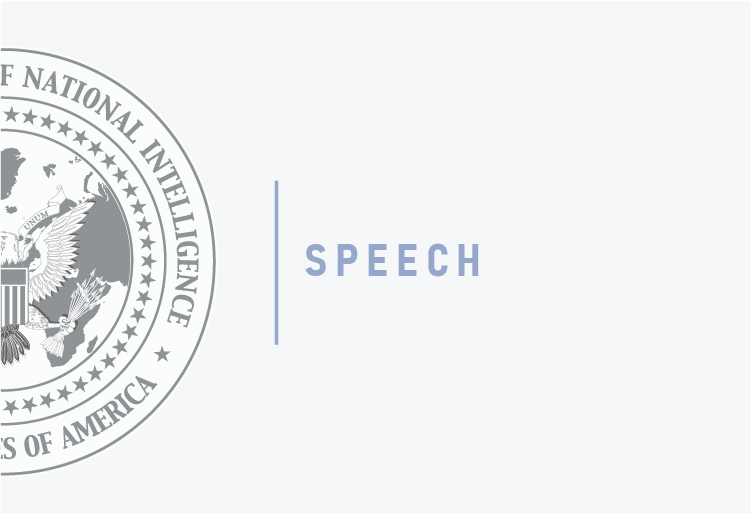Remarks by Acting Director of the National Counterterrorism Center
Brett M. Holmgren
Celebrating NCTC’s 20th Anniversary
September 16, 2024
McLean, Virginia
As Prepared
Good afternoon. I want to thank everyone for being here today, especially our former NCTC directors.
Last week, I was honored to represent NCTC at Ground Zero in New York City with President Biden and Vice President Harris to commemorate 23 years since the horrific attacks of September 11, 2001. As family members, colleagues, and loved ones read the names of those who perished that tragic day, many repeated the same two words: Never Forget. Never forget the lives and memories of those killed and the heroism and courage of the first responders. Never forget the unity and resilience we displayed as a Nation following the attacks. And, as a government, we must never forget the lessons of 9/11. In that connection, NCTC exemplifies the substantial reforms and improvements the U.S. government has made—across multiple administrations—to prevent another 9/11.
I’ve only been at NCTC for two months, so I’m going to keep my remarks short. But I want to leave you with three messages.
The first is thank you. Throughout my career, at the CIA, the White House, the Pentagon, the State Department, and now at the Office of the Director of National Intelligence, I’ve relied heavily on NCTC’s expertise and insights to inform policy, to provide an objective view of the threat, and to support counterterrorism planning and implementation. Whether it’s your articles in the President’s Daily Brief, NCTC’s very own Terrorism Intelligence Brief, independent threat assessments of terrorist leaders and groups, your support to screening and watchlisting, the 24/7 Ops Center, and many more functions, the fact is that policymakers, warfighters, diplomats, intelligence officers, homeland security and law enforcement officials rely on NCTC to execute their missions. As someone who has benefitted directly from NCTC’s work over the years, my message is simple: thank you.
Second, as the acting Director, I get to see every day the many ways that NCTC officers are safeguarding America’s security. Unfortunately, we can’t share publicly much of what you do, the role you play behind the scenes, or the key accomplishments in order to protect sensitive sources and methods. This means the American people don’t get to see what those of us in leadership see every day–the timely warnings provided, the threats disrupted, the terrorists brought to justice. But I hope that every NCTC officer–especially our junior officers–understands the importance of the mission, the magnitude of your work, and the stakes involved.
To underscore the impact, let me share just a few examples from recent years.
In 2015, when ISIS was at its peak in Iraq and Syria and holding several U.S. citizens hostage, NCTC helped lead the interagency policy review and conducted the initial, gut-wrenching engagements with hostage families. Their work ultimately served as the foundation for the 2015 presidential policy directive on hostage response that remains in effect today and that has enabled the recovery of multiple U.S. citizens held by foreign terrorist organizations around the world.
Separately, following the U.S. withdrawal from Afghanistan in 2021, NCTC officers worked around the clock to evaluate potential terrorist threats associated with more than 100,000 vulnerable Afghans, including those who worked alongside us in Afghanistan, to resettle safely in the United States. Without NCTC’s support, this historic effort–and the livelihoods and security of tens of thousands of at-risk Afghans–would not have succeeded. NCTC’s contributions, as well as those from many other departments and agencies, saved these people from a dark and potentially deadly future in Afghanistan.
Finally, more recently, NCTC officers were vital in identifying and disrupting eight potentially ISIS-linked individuals in the United States, some of whom may have been involved in operational activities. As a result of NCTC’s efforts, and in coordination with law enforcement and homeland security, a potentially significant threat was disrupted.
These examples are only a snapshot of the contributions NCTC makes to our Nation’s security. While we can’t always recognize publicly the impact of your work, know that President Biden, Vice President Harris, DNI Haines, and NCTC leadership see the value and importance of your work every day. And your efforts will be even more important as we confront a dynamic threat environment. Which brings me to my third and final point—the need to build a sustainable CT enterprise to confront a threat that is more diverse, complex and decentralized than what we’ve faced in the past.
Today, we’re facing another transformative moment in the global terrorism threat landscape. The threat is more diverse because the ideological motivations and range of foreign terrorist actors is multi-dimensional. Whereas in the past, the primary threats came from groups like al-Qa’ida, ISIS, Hizballah and homegrown violent extremists, today we’re also threatened by Iranian-linked groups, transnational racially and ethnically motivated extremists, and anti-government and anti-authority extremist groups, among others.
The threat is more complex because terrorists are upskilling and using new and emerging technologies, including 3D printing and artificial intelligence, to organize, recruit, distribute propaganda, and plan attacks. They’re also increasingly using new secure commercial platforms to obscure their activities.
Finally, the threat is more decentralized, in part due to several years of sustained U.S. counterterrorism pressure on groups like ISIS, al-Qa’ida and al-Shabaab, which has forced them to disperse geographically and to operate in smaller cells in more locations to evade security pressure. But other factors have also contributed to this decentralized threat, including new migration patterns driven partly by Russia’s unprovoked war in Ukraine, which has redirected Central Asian and Russian extremists to Western countries, as well as the rapid expansion of ISIS, al-Qa’ida and its offshoots throughout Africa.
But while the threat is becoming more diverse, complex and decentralized, it’s less sophisticated than what we’ve faced in the past. Still a lethal, serious threat, but lacking the capacity to launch an attack on the scale of 9/11, thanks to the hard work of the counterterrorism community over the last 23 years. Nevertheless, we must always remain vigilant as we know the threat can evolve.
Looking forward, there are three areas that I believe will define NCTC’s future.
First, embracing innovation and technology to enable operational support and strategic analysis, to create efficiencies in analyzing large datasets to detect trends and uncover leads, and to provide NCTC officers with the most modern tools to integrate and analyze increasingly complex threat information.
Second, leading the community when it comes to threat analysis, integration and warning. In essence, mastering the fundamentals of tactical and strategic threat analysis—providing unique value to policymakers, operators and the larger counterterrorism community.
And third, building a talented, diverse workforce that’s equipped to lead NCTC for years to come. In addition to investing in our current workforce, this requires recruiting new talent from throughout the entire country, with unique skills and expertise, and diverse backgrounds and experiences to promote creative thinking, challenge conventional wisdom, embrace new technologies, and use America’s diversity as a strength in the enduring battle against terrorism.
To me, that’s the future of NCTC—innovation and technology, being brilliant at the basics of threat analysis and integration, and investing in a workforce built for the future. As I look around the room today, I’ve never been more optimistic about NCTC’s future.
For those of you who’ve been at NCTC since the beginning, you know it’s been a long, challenging—but also rewarding—20 years. When we reflect on those 20 years, one thing is crystal clear: NCTC has had a profound impact on preventing terrorist attacks on the United States. But as a Nation, we can’t take our security for granted. It’s not a birthright. We have to foster a sustainable counterterrorism enterprise against an ever-changing threat. And I’m confident moving forward that, because of NCTC—and our counterterrorism partners throughout the U.S. Government and around the world—we’ll continue to keep the American people safe and secure.
To all NCTC officers, past and present, thanks for your extraordinary service. And happy 20th anniversary! Thank you.
###





